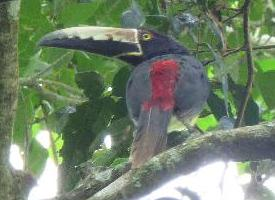
Váhy a míry
| Délka | 35 cm |
|---|
Popis zvířete
The Emerald Toucanet, scientifically known as Aulacorhynchus prasinus, is a vibrant and captivating bird species belonging to the Ramphastidae family, which also includes other toucans and aracaris. This species is renowned for its striking appearance and is primarily found in the forested regions stretching from Mexico, through Central America, to northern South America.Characterized by its relatively small size compared to other toucans, the Emerald Toucanet has an average length of about 30-35 cm (12-14 inches) and weighs around 130-250 grams. Despite its smaller stature, it boasts a remarkably colorful plumage. The bird's body is predominantly a lush, emerald green, which beautifully camouflages it within its leafy surroundings. The throat and chest areas may vary in color, displaying shades of white, yellow, or gray, often with a distinctive red or black border at the base. One of the most striking features of the Emerald Toucanet is its bill, which is proportionately large and exhibits a dazzling array of colors including green, yellow, and red, with a black tip, making it a spectacular sight to behold.
The Emerald Toucanet's habitat is mainly in humid mountain forests, cloud forests, and more open woodlands, ranging in elevation from 1000 to 2500 meters. It is a versatile bird, adapting to environments within both primary and secondary forests. The bird is often seen in pairs or small flocks, and it is known for its loud, frog-like calls that resonate through the forests, aiding in communication between individuals over the dense vegetation.
Diet-wise, the Emerald Toucanet is omnivorous, with a preference for a wide variety of fruits, which it skillfully plucks with its large bill. However, its diet is not limited to fruits alone; it also consumes insects, small reptiles, eggs, and nestlings of other birds, showcasing its adaptability in sourcing food.
Breeding behavior of the Emerald Toucanet is quite fascinating. They typically nest in tree cavities, which can be natural or previously excavated by other species such as woodpeckers. The female lays between 2 to 4 eggs, which are incubated by both parents. The chicks are altricial, meaning they are born blind and featherless, entirely dependent on their parents for warmth and food. Both parents participate actively in feeding and caring for the young until they are ready to fledge.
The Emerald Toucanet plays a crucial role in its ecosystem, particularly in seed dispersal, thanks to its fruit-dominated diet. By consuming fruits and traveling across distances, it helps in the propagation of many forest trees and plants, contributing to the health and regeneration of its habitat.
Despite facing threats from habitat destruction and the pet trade, the Emerald Toucanet is currently listed as Least Concern by the International Union for Conservation of Nature (IUCN), indicating that it is not immediately threatened with extinction. However, continued efforts in conservation and habitat protection are essential to ensure this vibrant bird species remains a flourishing part of its ecosystem for generations to come.
Podobná zvířata
Nové fotografie zvířat
Top 10 zvířat
- Dolphin gull (Leucophaeus scoresbii)
- Diana monkey (Cercopithecus diana)
- Moustached guenon (Cercopithecus cephus)
- Galápagos tortoise (Geochelone nigra complex)
- Russian tortoise (Testudo horsfieldii)
- Japanese macaque (Macaca fuscata)
- Stone loach (Barbatula barbatula)
- Greek tortoise (Testudo graeca)
- Common flying dragon (Draco volans)
- Colossal squid (Mesonychoteuthis hamiltoni)

